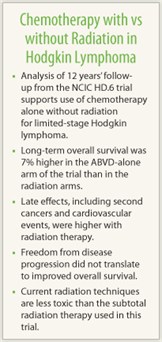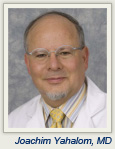An important study suggests that radiotherapy may not be a necessary addition to chemotherapy in previously untreated patients with limited-stage Hodgkin lymphoma, sparing patients the risks of late radiation-induced cardiac effects and second cancers. These data were based on 12 years of follow-up of the Hodgkin’s Disease 6 trial (HD.6), which was presented at the 53rd Annual Meeting of the American Society of Hematology in San Diego1 and published online simultaneously in The New England Journal of Medicine.2 (See added perspective on page 7.)
The study showed that ABVD (doxorubicin, bleomycin, vinblastine, and dacarbazine) chemotherapy alone achieved improved overall survival compared with radiation alone or radiation combined with ABVD. The 12-year overall survival rate was 94% for ABVD vs 87% for those who received radiation (P = .04). The rate of freedom from disease progression was lower in the ABVD arm vs radiation therapy at 12 years—87% vs 92% (P = .05)—demonstrating that in this trial, at least, progression-free survival was not predictive of overall survival.
Controversial Strategy
 “The strategy of treating limited-stage Hodgkin lymphoma with chemotherapy alone is controversial. Our results alter this debate. The 12-year rates of 87% for freedom from disease progression and 94% for overall survival in the ABVD arm suggest that chemotherapy alone can now more confidently be a therapeutic option for this population,” stated lead author Ralph M. Meyer, MD, Director of the NCIC Clinical Trials Group, and Professor at Queens University in Kingston, Ontario, Canada.
“The strategy of treating limited-stage Hodgkin lymphoma with chemotherapy alone is controversial. Our results alter this debate. The 12-year rates of 87% for freedom from disease progression and 94% for overall survival in the ABVD arm suggest that chemotherapy alone can now more confidently be a therapeutic option for this population,” stated lead author Ralph M. Meyer, MD, Director of the NCIC Clinical Trials Group, and Professor at Queens University in Kingston, Ontario, Canada.
Regarding the lower rate of freedom from disease progression in the ABVD arm, he said, “The standard paradigm that keeping disease away leads to living longer doesn’t hold in this trial. These results show that improved long-term survival is less dependent than previously assumed on further reducing deaths due to progressive Hodgkin lymphoma and instead emphasize a need for treatments that will not lead to deaths from late treatment effects,” Dr. Meyer said.
Patients with limited-stage Hodgkin lymphoma are typically treated with combination chemotherapy plus radiation. This treatment has been highly effective, but late effects of radiation are concerning.
Data Breakdown
 The NCIC Clinical Trials Group HD.6 trial enrolled 405 previously untreated patients with stage IA or IIA nonbulky Hodgkin lymphoma and compared 12-year overall survival in patients treated using ABVD alone or radiation with or without ABVD. Patients were stratified into low- or high-risk categories prior to randomization.
The NCIC Clinical Trials Group HD.6 trial enrolled 405 previously untreated patients with stage IA or IIA nonbulky Hodgkin lymphoma and compared 12-year overall survival in patients treated using ABVD alone or radiation with or without ABVD. Patients were stratified into low- or high-risk categories prior to randomization.
Findings related to overall survival and freedom from disease progression in the overall study population were generally similar among the high-risk patients. The rate of overall survival for high-risk patients was 92% in the ABVD arm vs 81% in the radiation arm. Overall, late treatment effects were lower in the ABVD arm. Second cancers were reported in 10 patients in the ABVD arm vs 23 in those treated with radiation. Cardiac events were reported in 16 patients treated with ABVD vs 26 patients who received radiation. Deaths due to second cancers occurred in 10 patients in the radiation arm vs 4 in the ABVD arm, and deaths from causes other than Hodgkin lymphoma or second cancers were also higher in the radiation arm: 10 vs 2, respectively.
“Overall survival is superior in patients treated with ABVD alone because there are fewer deaths from causes other than Hodgkin lymphoma. We recognize that radiation as used in this trial is outdated and excessive, and likely contributed to the excess deaths. However, our 12-year results with ABVD rival those described using current combined-modality strategies and reported with shorter follow-up,” Dr. Meyer said. ■
Disclosure: Dr. Meyer has received honoraria from Celgene regarding his role on the Independent Response Committee of a clinical trial and from Lilly regarding his role as Chair of an Independent Data Safety Monitoring Committee. He is Director of the NCIC CTG Clinical Trials Group which has received research funding from Amgen Canada, Ariad Pharmaceuticals, Astex Therapeutics, AstraZeneca, Bristol-Myers Squibb, Celgene, Lilly, GlaxoSmithKline, Janssen-Ortho, Merck Frosst Canada, Novartis, Oncothyreon, Orthobiotech, Pfizer, Roche, S*Bio Ptd Ltd, sanofi-aventis, Schering Canada, Zymogenetics.
Expert Point of View: Improved Survival with Chemotherapy Alone in Limited-stage Hodgkin Lymphoma

 The Canadian HD.6 randomized study in patients with nonbulky early-stage Hodgkin lymphoma is mostly of historic interest.1,2 It has little relevance to current treatment standards or questions, and the risk for its inappropriate interpretation is of great concern.
The Canadian HD.6 randomized study in patients with nonbulky early-stage Hodgkin lymphoma is mostly of historic interest.1,2 It has little relevance to current treatment standards or questions, and the risk for its inappropriate interpretation is of great concern.